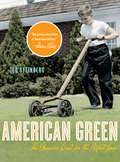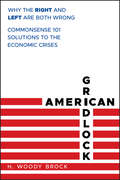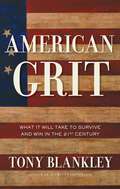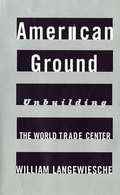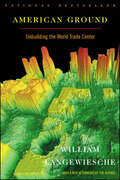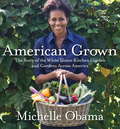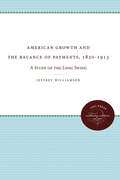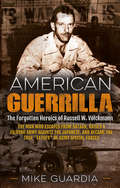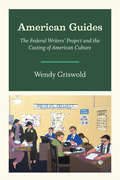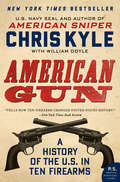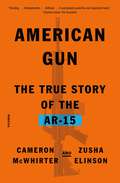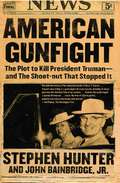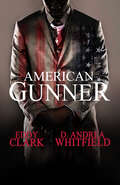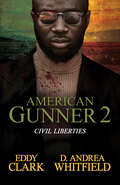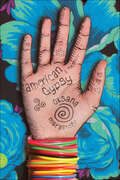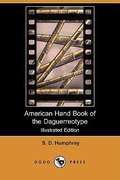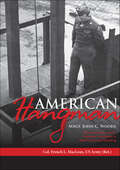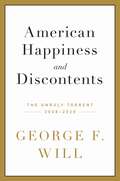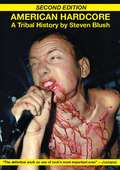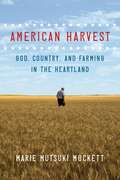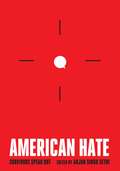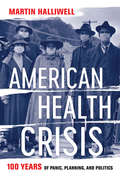- Table View
- List View
American Green: The Obsessive Quest For The Perfect Lawn
by Ted Steinberg“Ted Steinberg proves once again that he is a master storyteller as well as our foremost environmental historian.”—Mike Davis The rise of the perfect lawn represents one of the most profound transformations in the history of the American landscape. American Green, Ted Steinberg's witty exposé of this bizarre phenomenon, traces the history of the lawn from its explosion in the postwar suburban community of Levittown to the present love affair with turf colorants, leaf blowers, and riding mowers.
American Gridlock
by James A. Thurber Thurber, James A. and Yoshinaka, Antoine Antoine YoshinakaAmerican Gridlock brings together the country's preeminent experts on the causes, characteristics, and consequences of partisan polarization in US politics and government, with each chapter presenting original scholarship and novel data. This book is the first to combine research on all facets of polarization, among the public (both voters and activists), in our federal institutions (Congress, the presidency, and the Supreme Court), at the state level, and in the media. Each chapter includes a bullet-point summary of its main argument and conclusions, and is written in clear prose that highlights the substantive implications of polarization for representation and policy-making. Authors examine polarization with an array of current and historical data, including public opinion surveys, electoral and legislative and congressional data, experimental data, and content analyses of media outlets. American Gridlock's theoretical and empirical depth distinguishes it from any other volume on polarization.
American Gridlock
by BrockA sensible solution to getting our economy back on track Pessimism is ubiquitous throughout the Western World as the pressing issues of massive debt, high unemployment, and anemic economic growth divide the populace into warring political camps. Right-and Left-wing ideologues talk past each other, with neither side admitting the other has any good ideas. In American Gridlock, leading economist and political theorist H. Woody Brock bridges the Left/Right divide, illuminating a clear path out of our economic quagmire. Arguing from first principles and with rigorous logic, Brock demonstrates that the choice before us is not between free market capitalism and a government-driven economy. Rather, the solution to our problems will require enactment of constructive policies that allow "true" capitalism to flourish even as they incorporate social policies that help those who truly need it. Brock demonstrates how deductive logic (as opposed to ideologically driven data analysis) can transform the way we think about these problems and lead us to new and different solutions that cross the ideological divide. Drawing on new theories such as game theory and the economics of uncertainty that are based upon deductive logic, Brock reveals fresh ideas for tackling issues central to the 2012 U. S, Presidential election and to the nation's long-run future: Demonstrating that the concept of a government "deficit" is highly problematic since it blinds us to the distinction between a good deficit and a bad deficit - where a deficit is good if it results from borrowing dedicated to productive investment rather than to unproductive spending. Deriving the need for a U. S. Marshall Plan dedicated to very high levels of profitable infrastructure spending as the solution to today's Lost Decade of high unemployment Drawing upon a logical extension of the Law of Supply and Demand to demonstrate how the health-care spending crisis can be completely resolved by letting supply increase at a faster rate than demand Utilizing the theory of bargaining inaugurated by the "Beautiful Mind" mathematician John F. Nash, Jr. , to help us avoid being repeatedly duped in our negotiations with China Making use of a completely new theory of market risk recently developed at Stanford University to demonstrate why dramatically limiting leverage is the key reform to preventing future Perfect Storms, whereas hoping to banish "greed" amounts to whistling Dixie Deducting from first principles a solution to the contentious issue of fair shares of the economic pie, a solution that integrates the two fundamental norms of "to each according to his contribution" and "to each according to his need. " Profound, timely and important, American Gridlock cuts through the stale biases of the Right and Left, advances new ways of thinking, and provides creative solutions to the problems that threaten American society.
American Grit: What It Will Take To Survive And Win In The 21st Century
by Tony BlankleyTough Times Call for Tough ActionIn American Grit, nationally syndicated columnist Tony Blankley warns that the administration of Barack Obama is a potential disaster at a dangerous time for America.Challenging Americans to recapture the spirit of sacrifice that has historically characterized our nation, Blankley demonstrates how Obama's agenda, with its emphasis on environmental sensitivity, military retreat, and the diminution of executive branch powers, promotes national weakness as a righteous ideal. In contrast, Blankley puts forward his own nationalist program based on toughness, resoluteness, and grit--traditional American values totally absent from Obama's agenda. In this passionate, hard-hitting book, Blankley shows:* How Obama's plan for national service is a weak substitute for what America really needs--a full-on military draft* How Obama's infatuation with alternative energy will damage America's national interests* Why we need stricter laws to prevent the media from compromising our national security* Why the office of the presidency, contrary to popular belief, has not gained enough power since the September 11 attacks* How we can craft a successful foreign policy that avoids the mistakes of both the liberals and the neo-cons* How our war effort in Iraq was undermined by effective enemy propaganda--and what we can do about it* Why education reform under President Obama will fail to address one of the biggest problems in our education system: the failure to teach patriotismFilled with solutions to problems ranging from the detention of enemy combatants to dealing with aggressive petro-states like Russia, Venezuela, and Iran, American Grit demonstrates how this country can emerge from its current domestic and military challenges as a stronger, more unified, and more tenacious nation--and why under President Obama, it won't.
American Ground: Unbuilding the World Trade Center
by William LangewiescheAn interesting study of the rescue effort after 9-11 and the attempt to clear away the debris, including the conflict between the fire and policemen.
American Ground: Unbuilding the World Trade Center
by William LangewiescheSelected as one of the best books of 2002 by The New York Times, San Francisco Chronicle, Boston Globe, Los Angeles Times, and Chicago Sun-TimesWithin days after September 11, 2001, William Langewiesche had secured unique, unrestricted, round-the-clock access to the World Trade Center site. American Ground is a tour of this intense, ephemeral world and those who improvised the recovery effort day by day, and in the process reinvented themselves, discovering unknown strengths and weaknesses. In all of its aspects--emotionalism, impulsiveness, opportunism, territoriality, resourcefulness, and fundamental, cacophonous democracy--Langewiesche reveals the unbuilding to be uniquely American and oddly inspiring, a portrait of resilience and ingenuity in the face of disaster.
American Grown: The Story of the White House Kitchen Garden and Gardens Across America
by Michelle ObamaIn April 2009, First Lady Michelle Obama planted a kitchen garden on the White House's South Lawn. As fresh vegetables, fruit, and herbs sprouted from the ground, this White House Kitchen Garden inspired a new conversation all across the country about the food we feed our families and the impact it has on the health and well-being of our children. Now, in her first-ever book, American Grown, Mrs. Obama invites you inside the White House Kitchen Garden and shares its inspiring story, from the first planting to the latest harvest. Hear about her worries as a novice gardener - would the new plants even grow? Learn about her struggles and her joys as lettuce, corn, tomatoes, collards and kale, sweet potatoes and rhubarb flourished in the freshly tilled soil. Get an unprecedented behind-the-scenes look at every season of the garden's growth, with striking original photographs that bring its story to life. Try the unique recipes created by White House chefs and made with ingredients just picked from the White House garden. And learn from the White House Garden team about how you can help plant your own backyard, school or community garden. Mrs. Obama's journey continues across the nation as she shares the stories of other gardens that have moved and inspired her: Houston office workers who make the sidewalk bloom; a New York City School that created a scented garden for the visually impaired; a North Carolina garden that devotes its entire harvest to those in need; and other stories of communities that are transforming the lives and health of their citizens. In American Grown, Mrs. Obama tells the story of the White House Kitchen Garden, celebrates the bounty of gardens across our nation, and reminds us all of what we can grow together.
American Growth and the Balance of Payments, 1820-1913: A Study of the Long Swing
by Jeffrey WilliamsonThe basic purpose of Williamson's study is to determine whether the Kuznets cycles, or long swings in the domestic economy, have had any consistent effect on U. S. foreign trade and, as a result, on the nation's balance-of-payments position. The author has chosen the period from 1820 to 1913 and has studied it in detail.Originally published in 1964.A UNC Press Enduring Edition -- UNC Press Enduring Editions use the latest in digital technology to make available again books from our distinguished backlist that were previously out of print. These editions are published unaltered from the original, and are presented in affordable paperback formats, bringing readers both historical and cultural value.
American Guerrilla: The Forgotten Heroics of Russell W. Volckmann—the Man Who Escaped from Bataan, Raised a Filipino Army against the Japanese, and Became the True “Father” of Army Special Forces
by Mike GuardiaA main selection of the Military Book Club and a selection of the History Book Club With his parting words, "I shall return," General Douglas MacArthur sealed the fate of the last American forces on Bataan. Yet one young Army Captain named Russell Volckmann refused to surrender. He disappeared into the jungles of north Luzon where he raised a Filipino army of more than 22,000 men. For the next three years he led a guerrilla war against the Japanese, killing more than 50,000 enemy soldiers. At the same time he established radio contact with MacArthur's headquarters in Australia and directed Allied forces to key enemy positions. When General Yamashita finally surrendered, he made his initial overtures not to MacArthur, but to Volckmann. This book establishes how Volckmann's leadership was critical to the outcome of the war in the Philippines. His ability to synthesize the realities and potential of guerrilla warfare led to a campaign that rendered Yamashita's forces incapable of repelling the Allied invasion. Had it not been for Volckmann, the Americans would have gone in "blind" during their counter-invasion, reducing their efforts to a trial-and-error campaign that would undoubtedly have cost more lives, materiel, and potentially stalled the pace of the entire Pacific War. Second, this book establishes Volckmann as the progenitor of modern counterinsurgency doctrine and the true "Father" of Army Special Forces--a title that history has erroneously awarded to Colonel Aaron Bank of the European Theater of Operations. In 1950, Volckmann wrote two army field manuals: Operations Against Guerrilla Forces and Organization and Conduct of Guerrilla Warfare, though today few realize he was their author. Together, they became the US Army's first handbooks outlining the precepts for both special warfare and counter-guerrilla operations. Taking his argument directly to the army chief of staff, Volckmann outlined the concept for Army Special Forces. At a time when US military doctrine was conventional in outlook, he marketed the ideas of guerrilla warfare as a critical force multiplier for any future conflict, ultimately securing the establishment of the Army's first special operations unit--the 10th Special Forces Group. Volckmann himself remains a shadowy figure in modern military history, his name absent from every major biography on MacArthur, and in much of the Army Special Forces literature. Yet as modest, even secretive, as Volckmann was during his career, it is difficult to imagine a man whose heroic initiative had more impact on World War II. This long overdue book not only chronicles the dramatic military exploits of Russell Volckmann, but analyzes how his leadership paved the way for modern special warfare doctrine. Mike Guardia, currently an officer in the US 1st Armored Division is also author of Shadow Commander, about the career of Donald Blackburn, and an upcoming biography of Hal Moore.
American Guides: The Federal Writers’ Project and the Casting of American Culture
by Wendy GriswoldIn the midst of the Great Depression, Americans were nearly universally literate--and they were hungry for the written word. Magazines, novels, and newspapers littered the floors of parlors and tenements alike. With an eye to this market and as a response to devastating unemployment, Roosevelt's Works Progress Administration created the Federal Writers' Project. The Project's mission was simple: jobs. But, as Wendy Griswold shows in the lively and persuasive American Guides, the Project had a profound--and unintended--cultural impact that went far beyond the writers' paychecks. Griswold's subject here is the Project's American Guides, an impressively produced series that set out not only to direct travelers on which routes to take and what to see throughout the country, but also to celebrate the distinctive characteristics of each individual state. Griswold finds that the series unintentionally diversified American literary culture's cast of characters--promoting women, minority, and rural writers--while it also institutionalized the innovative idea that American culture comes in state-shaped boxes. Griswold's story alters our customary ideas about cultural change as a gradual process, revealing how diversity is often the result of politically strategic decisions and bureaucratic logic, as well as of the conflicts between snobbish metropolitan intellectuals and stubborn locals. American Guides reveals the significance of cultural federalism and the indelible impact that the Federal Writers' Project continues to have on the American literary landscape.
American Gun: A History of the U.S. in Ten Firearms
by William Doyle Chris KyleChris Kyle--fallen hero and #1 bestselling author of American Sniper--reveals how ten legendary guns forever changed U.S. history. At the time of his tragic death in February 2013, former Navy SEAL Chris Kyle, the top sniper in U.S. military history, was finishing one of the most exciting missions of his life: a remarkable book that retold American history through the lens of a hand-selected list of firearms. Kyle masterfully shows how guns have played a fascinating, indispensable, and often underappreciated role in our national story. "Perhaps more than any other nation in the world," Kyle writes, "the history of the United States has been shaped by the gun. Firearms secured the first Europeans hold on the continent, opened the frontier, helped win our independence, settled the West, kept law and order, and defeated tyranny across the world. "Drawing on his unmatched firearms knowledge and combat experience, Kyle carefully chose ten guns to help tell his story: the American long rifle, Spencer repeater, Colt . 45 revolver, Winchester rifle, Springfield 1903 rifle, Thompson sub-machine gun, 1911 pistol, M1 Garand, . 38 Special police revolver, and the M-16 rifle platform Kyle himself used as a SEAL. Through them, he revisits thrilling turning points in American history, including the single sniper shot that turned the tide of the Revolutionary War, the firearms designs that proved decisive at Gettysburg, the "gun that won the West," and the weapons that gave U. S. soldiers an edge in the world wars and beyond. This is also the story of how firearms innovation, creativity, and industrial genius has constantly pushed American history--and power--forward. Filled with an unforgettable cast of characters, Chris Kyle's American Gun is a sweeping epic of bravery, adventure, invention, and sacrifice.
American Gun: The True Story of the AR-15
by Cameron McWhirter Zusha ElinsonA finalist for the Los Angeles Times Book Prize“A magisterial work of narrative history and original reportage . . . You can feel the tension building one cold, catastrophic fact at a time . . . A virtually unprecedented achievement.” —Mike Spies, The New York Times Book Review (Editors’ Choice)A Washington Post top 50 nonfiction book of 2023 | Short-listed for the Zócalo Book PrizeOne of The New York Times’ 33 nonfiction books to read this fall | One of Esquire’s best books of fall | A Kirkus Reviews best nonfiction book of 2023Named a most anticipated book of the fall by The Washington Post, Los Angeles Times, and BloombergAmerican Gun: The True Story of the AR-15 presents the epic history of America’s most controversial weapon.In the 1950s, an obsessive firearms designer named Eugene Stoner invented the AR-15 rifle in a California garage. High-minded and patriotic, Stoner sought to devise a lightweight, easy-to-use weapon that could replace the M1s touted by soldiers in World War II. What he did create was a lethal handheld icon of the American century.In American Gun, the veteran Wall Street Journal reporters Cameron McWhirter and Zusha Elinson track the AR-15 from inception to ubiquity. How did the same gun represent the essence of freedom to millions of Americans and the essence of evil to millions more? To answer this question, McWhirter and Elinson follow Stoner—the American Kalashnikov—as he struggled mightily to win support for his invention, which under the name M16 would become standard equipment in Vietnam. Shunned by gun owners at first, the rifle’s popularity would take off thanks to a renegade band of small-time gun makers. And in the 2000s, it would become the weapon of choice for mass shooters, prompting widespread calls for proscription even as the gun industry embraced it as a financial savior. Writing with fairness and compassion, McWhirter and Elinson explore America’s gun culture, revealing the deep appeal of the AR-15, the awful havoc it wreaks, and the politics of reducing its toll. The result is a moral history of contemporary America’s love affair with technology, freedom, and weaponry.Includes 8 pages of black-and-white images.
American Gunfight: The Plot to Kill Harry Truman--and the Shoot-out that Stopped It
by Stephen Hunter John Bainbridge Jr.A fast-paced, definitive, and breathtakingly suspenseful account of an extraordinary historical event—the attempted assassination of President Harry Truman in 1950 by two Puerto Rican Nationalists and the bloody shoot-out in the streets of Washington, DC, that saved the president's life.Written by Pulitzer Prize-winner and New York Times bestselling novelist Stephen Hunter, and John Bainbridge, Jr., an experienced journalist and lawyer, American Gunfight is at once a groundbreaking work of meticulous historical research and the vivid and dramatically told story of an act of terrorism that almost succeeded. They have pieced together, at last, the story of the conspiracy that nearly doomed the president and how a few good men—ordinary guys who were willing to risk their lives in the line of duty—stopped it. It begins on November 1, 1950, an unseasonably hot afternoon in the sleepy capital. At 2:00 P.M. in his temporary residence at Blair House, the president of the United States takes a nap. At 2:20 P.M., two men approach Blair House from different directions. Oscar Collazo, a respected metal polisher and family man, and Griselio Torresola, an unemployed salesman, don&’t look dangerous, not in their new suits and hats, not in their calm, purposeful demeanor, not in their slow, unexcited approach. What the three White House policemen and one Secret Service agent cannot guess is that under each man's coat is a 9mm automatic pistol and in each head, a dream of assassin's glory. At point-blank range, Collazo and then Torresola draw and fire and move toward the president of the United States. Hunter and Bainbridge tell the story of that November day with narrative power and careful attention to detail. They are the first to report on the inner workings of this conspiracy; they examine the forces that led the perpetrators to conceive the plot. The authors also tell the story of the men themselves, from their youth and the worlds in which they grew up to the women they loved and who loved them to the moment the gunfire erupted. Their telling commemorates heroism—the quiet commitment to duty that in some moments of crisis sees some people through an ordeal, even at the expense of their lives.
American Gunner (Gunner)
by Eddy Clark D. Andrea WhitfieldImaginatively rendered and a gripping debut, a young man&’s dance with the criminal underworld lands him in international hot water and left vying for his life in this crime thriller mash-up of American Gangster and The Bourne Identity. Raphael Waters grew up accustomed to being in a constant state of survival. When he becomes the muscle for known street figure, Rah, he believes his life has taken a turn for the better. That is until a string of unfortunate circumstances leave Rah missing and Raphael grasping for answers in the streets of the concrete jungle—once again. A chance encounter with the intriguing Alex Gatts promises to be the life-changing turnaround he needs. Alex Gatts is the perfect mixture of beauty and brawn. She rules the nightlife of South Bend with every click of her sky-high stilettos. When she hires Raphael as her bodyguard, an unexpected friendship develops, sparking a lucrative business proposition that could give Alex the edge she desires. Raphael lets his guard down and breaks his cardinal rule: Never trust a woman. Together they embark on a series of real estate deals that solidifies their standing amongst the country&’s elite and most powerful syndicate. When an international business deal of a lifetime goes awry, Raphael is left holding the bag in enemy territory. &“This story hooked me from the very first page . . . all the twists and turns you need in a suspense story, including a romance you never expected to happen! I highly recommend it for fans of crime thrillers. You won&’t be disappointed.&” —Shakir Rashaan, bestselling author of Neverwraith
American Gunner 2: Civil Liberties (Gunner #2)
by Eddy Clark D. Andrea WhitfieldMore than a thriller, this pulse-pumping saga offers a captivating glimpse into a treacherous underworld filled with grit and suspense. Fans of crime literature should be prepared for an exhilarating ride as they buckle up and ride shotgun in this gripping page turner. Though battle-wounded and scarred, Raphael has survived the criminal underworld in Benin with the help of the US government. Together with his wife, Essie, and their adoptive son, Kaion, they enjoy a seemingly picture-perfect life. Their harmony is shattered when CIA agent Rhys unexpectedly shows up at their doorstep. No aspect of life comes without a cost, and Raphael soon realizes that even his comfortable existence has a price. In a move to bring down Abaku, the mastermind behind US financial scams and the same man responsible for the international wire fraud that nearly cost Raphael his life, the US government opts to cash in their favor, endangering the lives of those Raphael cherishes the most. To expose the elusive enemy, Raphael must delve deeper than he ever imagined, putting his family at risk and questioning loyalties. Betrayal lurks around every corner as he is coerced into joining an elite government agency, and the stakes are higher than ever before. As the casualties mount in this deadly game of cat and mouse, Raphael must discern friend from foe in order to survive and save his family.
American Gypsy: A Memoir
by Oksana MarafiotiA vivid and funny memoir about growing up Gypsy and becoming AmericanFifteen-year-old Oksana Marafioti is a Gypsy. This means touring with the family band from the Mongolian deserts to the Siberian tundra. It means getting your hair cut in "the Lioness." It also means enduring sneering racism from every segment of Soviet society. Her father is determined that his girls lead a better, freer life. In America! Also, he wants to play guitar with B. B. King. And cure cancer with his personal magnetism. All of this he confides to the woman at the American embassy, who inexplicably allows the family entry. Soon they are living on the sketchier side of Hollywood.What little Oksana and her sister, Roxy, know of the United States they've learned from MTV, subcategory George Michael. It doesn't quite prepare them for the challenges of immigration. Why are the glamorous Kraft Singles individually wrapped? Are the little soaps in the motels really free? How do you protect your nice new boyfriend from your opinionated father, who wants you to marry decently, within the clan?In this affecting, hilarious memoir, Marafioti cracks open the secretive world of the Roma and brings the absurdities, miscommunications, and unpredictable victories of the immigrant experience to life. With unsentimentally perfect pitch, AmericanGypsy reveals how Marafioti adjusted to her new life in America, one slice of processed cheese at a time.
American Hand Book of the Daguerreotype
by S. D. HumphreySamuel Dwight Humphrey (1823-1883) was a prominent American daguerreotypist. <P> <P> He was the editor of The Daguerreian Journal which he began to publish in 1850, later changing the title to Humphrey's Journal Devoted to the Daguerrean and Photogenic Arts. He was one of the first people to take a photograph of the moon. His works include: A System of Photography (1849), The American Hand Book of the Daguerreotype (1853) and A Practical Manual of the Collodion Process (1857).
American Hangman: MSgt. John C. Woods: The United States Army’s Notorious Executioner in World War II and Nürnberg
by French L. MacLeanThe first biography of MSgt. John C. Woods, infamous US Army hangman of the Nuremberg trials MacLean meticulously separates fact from the mythology surrounding this enigmatic figure This is a follow-on book to The Fifth Field, winner of the 2013 Richard G. Trefry Award from the Army Historical Foundation
American Happiness and Discontents: The Unruly Torrent, 2008-2020
by George F. WillExamine the ways in which expertise, reason, and manners are continually under attack in our institutions, courts, political arenas, and social venues with this collection from the Pulitzer Prize-winning conservative columnist. George F. Will has been one of this country&’s leading columnists since 1974. He won the Pulitzer Prize for it in 1977. The Wall Street Journal once called him &“perhaps the most powerful journalist in America.&” In this new collection, he examines a remarkably unsettling thirteen years in our nation&’s experience, from 2008 to 2020. Included are a number of columns about court cases, mostly from the Supreme Court, that illuminate why the composition of the federal judiciary has become such a contentious subject. Other topics addressed include the American Revolutionary War, historical figures from Frederick Douglass to JFK, as well as a scathing assessment of how State of the Union Addresses are delivered in the modern day. Mr. Will also offers his perspective on American socialists, anti-capitalist conservatives, drug policy, the criminal justice system, climatology, the Coronavirus, the First Amendment, parenting, meritocracy and education, China, fascism, authoritarianism, Frank Sinatra, Bob Dylan, The Beach Boys, and the morality of enjoying football. American Happiness and Discontents: The Unruly Torrent, 2008-2020 is a collection packed with wisdom and leavened by humor from one the preeminent columnists and intellectuals of our time.
American Hardcore
by Steven Blush George Petros"American Hardcore sets the record straight about the last great American subculture"-Paper magazineSteven Blush's "definitive treatment of Hardcore Punk" (Los Angeles Times) changed the way we look at Punk Rock. The Sony Picture Classics-distributed documentary American Hardcore premiered at the 2006 Sundance Film Festival. This revised and expanded second edition contains hundreds of new bands, thirty new interviews, flyers, a new chapter ("Destroy Babylon"), and a new art gallery with over 125 rare photos and images.
American Harvest: God, Country, and Farming in the Heartland
by Marie Mutsuki MockettAn epic story of the American wheat harvest, the politics of food, and the culture of the Great PlainsFor over one hundred years, the Mockett family has owned a seven-thousand-acre wheat farm in the panhandle of Nebraska, where Marie Mutsuki Mockett’s father was raised. Mockett, who grew up in bohemian Carmel, California, with her father and her Japanese mother, knew little about farming when she inherited this land. Her father had all but forsworn it.In American Harvest, Mockett accompanies a group of evangelical Christian wheat harvesters through the heartland at the invitation of Eric Wolgemuth, the conservative farmer who has cut her family’s fields for decades. As Mockett follows Wolgemuth’s crew on the trail of ripening wheat from Texas to Idaho, they contemplate what Wolgemuth refers to as “the divide,” inadvertently peeling back layers of the American story to expose its contradictions and unhealed wounds. She joins the crew in the fields, attends church, and struggles to adapt to the rhythms of rural life, all the while continually reminded of her own status as a person who signals “not white,” but who people she encounters can’t quite categorize.American Harvest is an extraordinary evocation of the land and a thoughtful exploration of ingrained beliefs, from evangelical skepticism of evolution to cosmopolitan assumptions about food production and farming. With exquisite lyricism and humanity, this astonishing book attempts to reconcile competing versions of our national story.
American Hate: Survivors Speak Out
by Arjun SethiIn a series of powerful, unfiltered testimonials, people of various races, ethnicities, faiths, and genders speak out about now having to live in fear of long-standing, deeply rooted hatred and citizen-on-citizen violence that the Trump administration has given license to flourish.
American Haven
by Elizabeth YatesTeenagers Michael and Meredith Lamb find new friends and mountains to climb when they travel from war-torn London to New Hampshire with their Uncle Tony during World War II.
American Hazardscapes: The Regionalization of Hazards and Disasters
by Natural Hazardas DisasterBarrier islands. Flood plains. Earthquake faults. Sometimes the environment poses threats to our well being, yet many of us continue to choose to live in risky or dangerous places. And on top of the “knowns” are the other, more hidden hazards related to environmental contamination that pose equally serious threats to our health and well being.But where are these places and what types of hazards are found there? American Hazardscapes examines the risks associated with living and owning property in diverse regions across the United States, offering dual perspectives: that of the geographer and that of the social science hazards researcher. The book summarizes what we already know about regional patterns of hazard events and losses during the previous three decades and goes further to shed light on the nature of the events themselves and their impact on society.Written for the relocating citizen and the policy maker alike, American Hazardscapes presents a regional ecology of disaster-prone or disaster-resistant states. It also offers thoughts on what local, state, and federal managers need to do to meet the challenge of reducing hazard losses in the next century.
American Health Crisis: One Hundred Years of Panic, Planning, and Politics
by Martin HalliwellA history of U.S. public health emergencies and how we can turn the tide. Despite enormous advances in medical science and public health education over the last century, access to health care remains a dominant issue in American life. U.S. health care is often hailed as the best in the world, yet the public health emergencies of today often echo the public health emergencies of yesterday: consider the Great Influenza Pandemic of 1918–19 and COVID-19, the displacement of the Dust Bowl and the havoc of Hurricane Maria, the Reagan administration’s antipathy toward the AIDS epidemic and the lack of accountability during the water crisis in Flint, Michigan. Spanning the period from the presidency of Woodrow Wilson to that of Donald Trump, American Health Crisis illuminates how—despite the elevation of health care as a human right throughout the world—vulnerable communities in the United States continue to be victimized by structural inequalities across disparate geographies, income levels, and ethnic groups. Martin Halliwell views contemporary public health crises through the lens of historical and cultural revisionings, suturing individual events together into a narrative of calamity that has brought us to our current crisis in health politics. American Health Crisis considers the future of public health in the United States and, presenting a reinvigorated concept of health citizenship, argues that now is the moment to act for lasting change.
